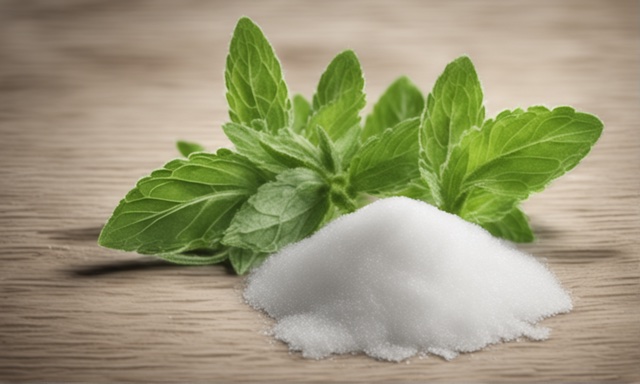Internet Asks: "Is Truvia Good for Diabetics?"
Truvia is a popular brand of sweetener made from the stevia plant. As diabetes rates continue to rise globally, there has been a marked increase in the search for sugar alternatives. For diabetics, managing blood sugar levels is crucial, and diet plays a significant role in this endeavor. Here, we examine the suitability of Truvia for those with diabetes.
sponsored links

What is Truvia?
Truvia is a sugar substitute derived primarily from the leaves of the stevia plant, a natural sweetener used for centuries in South America. It is a calorie-free sweetener, making it an attractive option for individuals looking to reduce calorie intake while still enjoying a sweet taste.
Components of Truvia
Truvia consists of three main components:
- - Erythritol: A sugar alcohol with almost no calories, erythritol doesn't affect blood glucose or insulin levels in the body, making it safe for diabetics.
- - Stevia Leaf Extract: Extracted from the stevia plant, stevia leaf extract is a natural sweetener that is several hundred times sweeter than sugar but does not affect blood glucose levels.
- - Natural Flavors: These enhance the sweetener's taste, providing a sugar-like flavor and mouthfeel.
Truvia and Blood Sugar Levels
- - No Impact on Blood Glucose: Studies have shown that the steviol glycosides in Truvia don’t impact blood sugar levels, making it a potential alternative for diabetics who want to avoid blood sugar spikes.
- - Erythritol Factor: The erythritol in Truvia also has a negligible effect on blood sugar. Erythritol is absorbed into the bloodstream but is excreted unchanged through urine, so it doesn't provide any calories or raise blood sugar levels.
sponsored links
Benefits for Diabetics
- 1. Calorie Reduction: Truvia provides a sweetness similar to sugar but without the accompanying calories, helping diabetics manage their weight—a significant factor in diabetes control.
- 2. Glycemic Index: The glycemic index (GI) measures how quickly foods raise blood sugar levels. Truvia has a GI of zero, meaning it doesn't raise blood glucose levels when consumed.
- 3. Taste: Many diabetics find that Truvia closely mimics the taste of sugar, making it an attractive option for sweetening foods and beverages.
- 4. Tooth-Friendly: Unlike sugar, Truvia does not contribute to tooth decay, a significant concern for individuals with diabetes who are often at higher risk of dental problems.
Considerations
- - Digestive Concerns: Like other sugar alcohols, erythritol can cause digestive issues in some people, especially when consumed in large amounts. Symptoms might include gas, bloating, or diarrhea.
- - Personal Tolerance: While many people with diabetes tolerate Truvia without issues, individual reactions can vary. Monitoring blood sugar levels and noting any changes or anomalies after consuming products with Truvia is advisable.
- - Not a Magic Solution: While helpful, relying solely on sugar substitutes won't guarantee diabetes management. It should be part of a comprehensive approach including diet, exercise, and medication as necessary.
Consultation is Key
Before making any significant changes to your diet, especially if you have underlying health conditions like diabetes, it's essential to consult with healthcare professionals. Nutritionists, dietitians, or endocrinologists can provide personalized advice based on your health profile and dietary needs.
Conclusion
Truvia, with its base in the stevia plant, offers a promising alternative for diabetics looking to reduce their sugar intake without compromising on taste. Its negligible impact on blood sugar makes it a suitable choice for many. However, as with any dietary change, especially for individuals with health conditions like diabetes, it's essential to consult with a healthcare professional or nutritionist before making significant adjustments to one's diet.
Disclaimer: This article is intended for informational purposes only and is not a substitute for professional medical advice, diagnosis, or treatment. Always consult with your physician or other qualified health providers with any questions you may have regarding a medical condition or dietary change.
sponsored links
References
1. Truvia About Truvia® Sweetness. https://www.truvia.com/why-truvia#:~:text=Three%20Ingredients.&text=Truvia%20Calorie%2Dfree%20Stevia%20Sweetener,and%20extract%20its%20natural%20sweetness
2. UCSF Medical Center Nutrition & Food Services. Sweeteners. https://dtc.ucsf.edu/pdfs/Sweeteners_04.30.10.pdf
3. Diabetes UK. sugar, sweeteners and diabetes. https://www.diabetes.org.uk/guide-to-diabetes/enjoy-food/carbohydrates-and-diabetes/sugar-sweeteners-and-diabetes
4. Truvia Canada. Truvía® Health & Dietary Information. https://www.truvia.ca/health/diabetes
5. WebMD. What Is Erythritol?. https://www.webmd.com/diet/what-is-erythritol
6. Food Standards Australia & New Zealand. Steviol glycosides (960) (intense sweetener) (stevia) . https://www.foodstandards.gov.au/consumer/additives/Pages/Steviol-glycosides-(960)-(intense-sweetener)%20(stevia).aspx
People are also reading...
Whole30 What to Expect?
Calories In Steak?
Chicken Taco Calories?
Does Hot Chocolate Have Caffeine?
Are Carrots Acidic?
Are Mangoes Acidic?
Orange Juice pH?
Does Kahlua Have Caffeine?
Calories In a Grilled Cheese?
Is Watermelon Acidic?
6 oz Steak Calories?
Are Strawberries Acidic?
Ready to level-up?
Create meal plans 10x faster, follow up with your clients through our mobile app, and never struggle with meal planning or recipe management again.